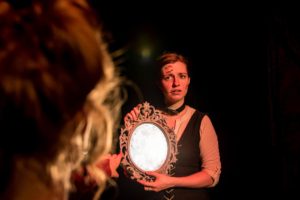
Kate (Aiyanna Wade) holds the mirror for Elizabeth (Mary-Kate Arnold). Kate’s makeup design by Jay Megan Sushka. Lighting by Benjamin Dionysus. Costumes by Delena Bradley. Photo by iNDie Grant Productions.
In Act I Scene I of Countess Bathory, Kate is a young servant with a lovely voice, who is ordered to sing at Elizabeth’s wedding (and happy to do so). A single thoughtless statement from the wrong person at the wrong time soon lands her in Elizabeth’s chambers, where a pair of heartless bullies hurl esoteric jokes at her, mock her, and offer her the chance to escape if she can convince them that she is both stupid and sinful. This escape is an illusion, however, as the bullies offer these choices as mutually exclusive. In reality, the entire game is just a way to stall for time until Bathory arrives to seal Kate’s fate.
This game, where powerful people create the illusion of choice in order to torment those weaker than themselves, is recurrent throughout Countess Bathory. Helena Jo and Anna Darvolya give Kate the illusion of escape. King Matthias twice leads Ferenc Nadasdy to think he is sent out to fight the Turks (and die) due to his own fiery passion, but then reveals to other courtiers that he intended to send the knight out to his death all along. Drugeth (and the Hapsberg lords) tell Bathory she must convince them to fight for her, when in realty they must serve her by royal decree. Perhaps most glaring of all, virtually everyone tells Elizabeth she might be spared her ignominious fate if she would only stop abusing the innocent. In reality, it is her money they want, and there is nothing Elizabeth can do to change that.
One might be tempted to think that Kate could have been spared her own horrible fate if she had answered correctly, or even if only Elizabeth’s husband had not arbitrarily commented on Kate’s beauty. But the reality is, in Bathory’s house, sooner or later Kate would have become the object of abuse. This is one of the crowning cruelties of abusers: the illusion of choice, and specifically the false idea that the victim is somehow primarily responsible for their abuser’s actions.
People (especially people in the US) like to believe that anything is possible if you work hard enough or smart enough. They especially don’t like to admit that other people may be formatively or even irrevocably responsible for their lives (if successful) or the lives of others (if unsuccessful).
It’s a nice idea, that we all have absolute freedom over our choices, but in practice it rarely works. Abuse victims stay in abusive relationships because they are conditioned to believe that escape is not an option: they are limited by their frame of reference. Limited frame of reference and limited resources necessarily limit our freedoms to act. Because these frames of reference and resources come primarily from other people (for example, parents) who themselves are limited by those who came before them, a large part of someone’s destiny is spelled out at the moment of their birth. For the fictional Kate, this is especially noticeable: a Baroque servant had little choice regarding who she served, when or how. Short of risking starvation or even greater punishment by running out, there was little Kate could do. The crucibles of obstacles that make people stronger can just as easily make them weaker or destroy them altogether. One’s success over such obstacles is very often determined by the resources one has, which again…
This is perhaps Elizabeth’s most redeeming quality: she does not present false options to others. She lies as well as anyone else (to those in positions of power), but when she offers the option of escape, the option is genuine. We can see this in Jane, who makes a terrible choice to save her own life, but does indeed manage to survive the encounter. Even the terribly moral Zavodsky does not do this. “Give us Bathory or die,” she says. This too proves to be a false option.
Towards the end of Countess Bathory, Kate observes (she does a lot of observing) that even the most powerful people are still subject to whims beyond their ability. Kate hopes briefly to assert some control over her environment, but is quickly shown that not only do her actions have little effect, but that those far more powerful than herself remain shockingly, inextricably unmoved by the injustices they claim to despise. We are conditioned to want what others want us to want. Only by choosing the thing she does not want, can Kate exercise any freedom in her world.
Downer…
“Our Dreams torment us more than nightmares might,
Our Terrors tell us what need never fear,
But Dreams will show us what can never be,
Present alluring trinkets never meant
For we, and with the aching dawn of waking
They draw away, expunge all Hope from us.
What loathsome terror, to be free of Fear,
With naught but Dreams to augment our dispair.
I prithee be my Goddess, kill my Dreams.”

COUNTESS BATHORY is back, Thursday – Saturday. Reservations are full, but walkups are welcome.
June 9 – 25
Thursday, Friday, and Saturday at 7:30pm
4001 N Ravenswood Ave, Ste 405
ALL SEATS ARE FREE
